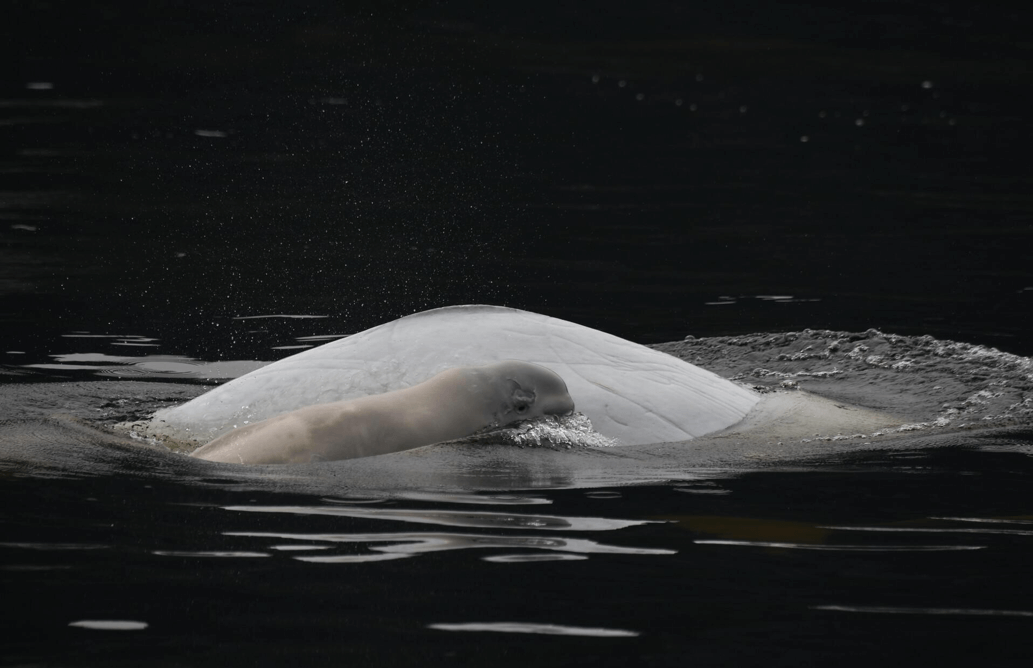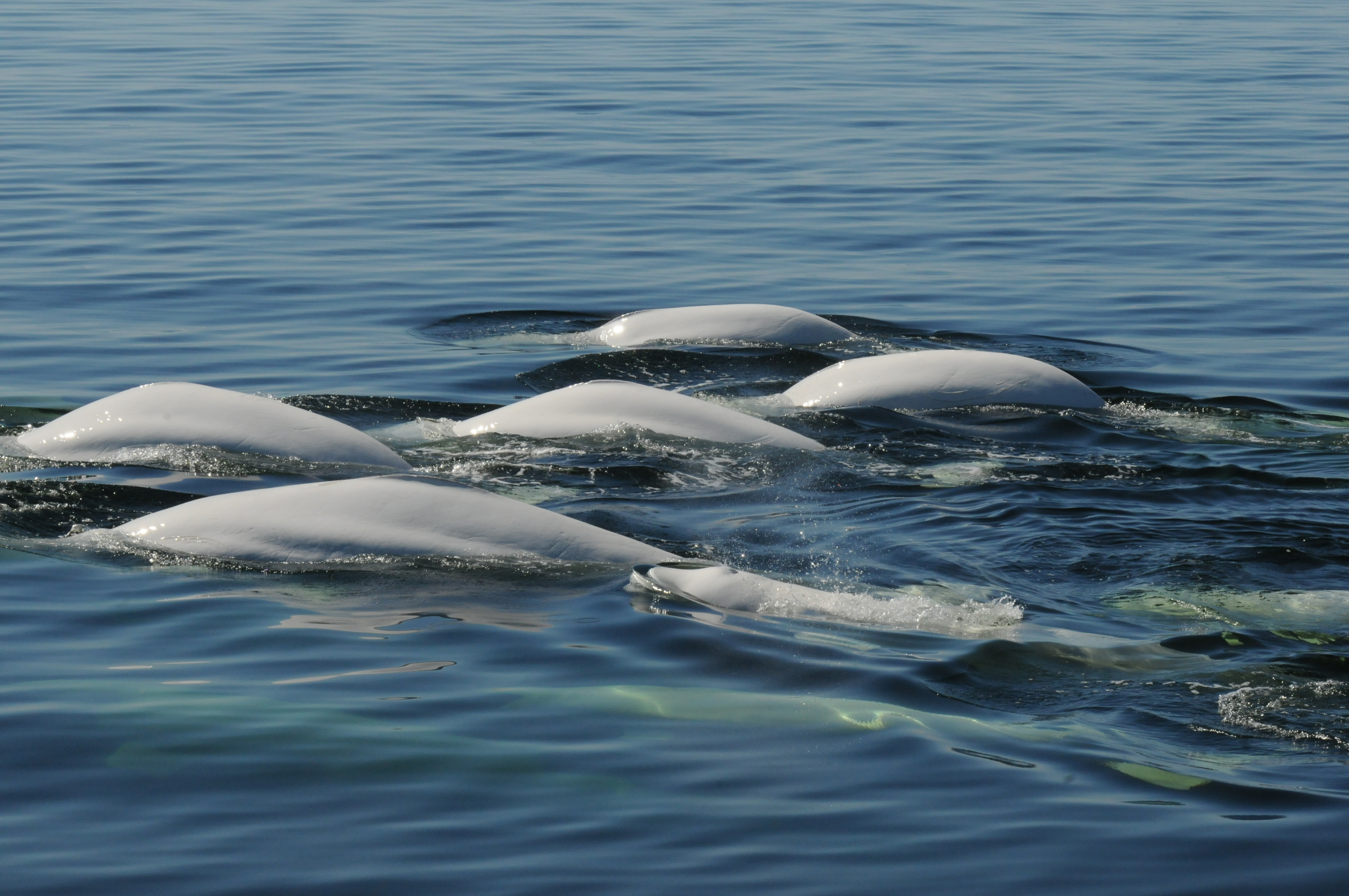Élizabeth, research assistant for the Group for Research and Education on Marine Mammals (GREMM), has been photographing belugas since May 2022. She also helps with the analysis of whale data and images. In honour of the International Day of Women and Girls in Science, she tells us about her journey, what it’s like to be a woman in science and her boundless passion for whales.
Tell us a bit about your background
My first job in the field of marine mammals was with GREMM in 2019. I was working as a research assistant during the summer between Cégep (Translator’s note: Quebec college) and university. I then completed a program in environmental sciences at Dawson College in Montréal followed by a bachelor’s degree in biology at Université de Montréal. That’s where I met Jade-Audrey, my future colleague at GREMM! I returned to Tadoussac every summer throughout my undergraduate studies. During the summers of 2020 and 2021, I worked with whales in the Saguenay-St. Lawrence Marine Park. I carried out whale surveys and censuses in Sainte-Marguerite Bay as well as on whale-watching boats. Then, after I finished my bachelor’s degree in April 2022, I was quite lucky and managed to land a job at GREMM.
How did you discover the world of marine mammals?
At a very young age, I knew I wanted to work with animals. Then, I made a mistake a lot of kids make: When I was 7, I visited SeaWorld in San Diego with my family. I participated in a show at the aquarium with dolphins and pilot whales. I was already hooked, but I think it was when I was 10 or 12 years old and we came to Tadoussac and took a cruise that I really discovered my passion. It was AMAZING. For me, this was the big trigger. It’s one thing to see them in wildlife documentaries or in an aquarium, but now I was old enough to understand the beauty of these animals. It was love at first sight and at that moment, I knew this was what I wanted to work toward. Something that really struck me on the cruise, and still to this day, is when whales surface to breath. Especially that first spout, when they come out of the water and it’s been a long time since they took their last breath. We encounter a lot of mammals, but it’s rare that we hear them breath like that.
Tell us about a memory related to your job with GREMM
The first one that comes to mind took place early last October. We were on the water on a beautiful and calm autumn day. At first, we were having a little trouble finding any belugas. We ended up locating a few, maybe twenty individuals, then the sun started to come out and our tally reached fifty or so, which is pretty good. Now and again the wind would suddenly pick up, which made it more difficult to work. Then I gazed into the distance and spotted what looked like lots of little wave crests. I tell myself that it’s the stiff breeze that just kicked up, but these “whitecaps” are moving a bit strangely. I consult my colleague Mathieu and we realize that they are actually belugas. There were 200 or 250 belugas coming right at us! We knew it was going to be a challenge to photograph all of them, as we wanted to miss as few individuals as possible. It was crazy. But it was also really cool because although it’s somewhat more common for belugas to band together in the fall, it wasn’t often that I was able to actually witness such congregations. And especially to see them arrive from afar. All of a sudden we felt quite tiny in our little Zodiac! It was really a nice surprise, as our expectations weren’t very high that day. If I remember correctly, I think I took around 500 photos that day!
What kinds of challenges do you face?
I feel like there are a lot of barriers for women in science and in life in general. Sometimes it’s more difficult to have self-confidence and see yourself for all that you’re worth. You mustn’t be afraid to go for it.
Personally, I realize that I’ve been really lucky, but I know that throughout my post-secondary studies I had friends who experienced sexism. There is also the wage gap. According to Statistics Quebec, in 2021, the hourly wage of white women was around 91% that of men, and we’re not even talking about racialized women, Indigenous women, recent immigrants, etc. In other words, systemic barriers still exist.
How do you see the place of women in science and how can we encourage them to get more involved in science?
First of all, I think women DO have their place in science; women have their place everywhere. Throughout my studies and my career, I did not feel that women were a minority, but I also know that it is not like that for everyone.
I find that to encourage girls, we must emphasize women’s contribution to science by highlighting the diverse and interesting potential paths that are available so that young women and girls can see that opportunities do indeed exist. I feel that it would take more women in management and other senior positions to prove that we not only have our place within the team, but that we can develop and progress in this discipline. We are not limited to specific hierarchical strata.
A lot of it comes down to education. Men share part of the responsibility, but so do those of us who belong to the privileged class. As a white woman, I enjoy certain privileges compared to a racialized woman. I believe it is up to privileged people to recognize this and use this privilege to help others. This requires a lot of mutual assistance and compassion.






